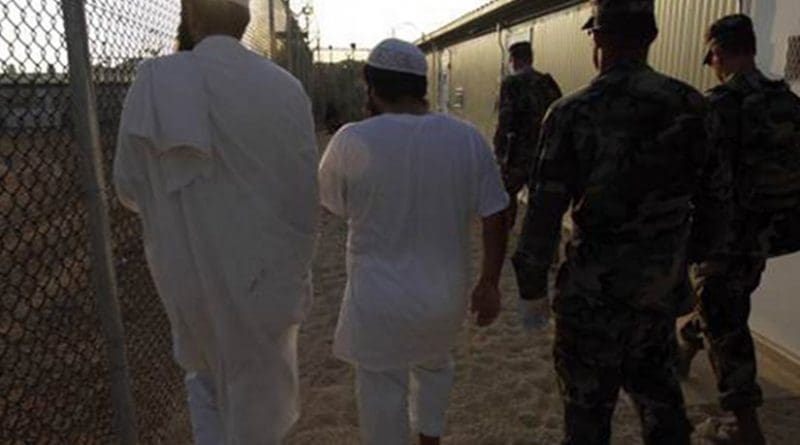Yemeni Freed In Cape Verde: 59 Men Left In Guantánamo – OpEd
Good news from Guantánamo, as the first prisoner to be released since Donald Trump won the Presidential Election last month has been freed in Cape Verde, an island nation off the west coast of Africa.
Shawki Awad Balzuhair (aka Shawqi Balzuhair), a 35-year old Yemeni prisoner, was approved for release in July, by a Periodic Review Board, a high-level government review process set up in 2013 to review the cases of all the prisoners still held who are not facing trials and had not already been approved for release.
Seized in one of a series of house raids in Karachi, Pakistan on September 11, 2002, Balzuhair and five other men were originally — and mistakenly — regarded as members of an al-Qaeda cell-in-waiting, and described as the “Karachi Six.” By the time the six had their cases reviewed this year, however, the US government had walked back from its claims, after “a review of all available reporting,” accepting that “this label more accurately reflects the common circumstances of their arrest and that it is more likely the six Yemenis were elements of a large pool of Yemeni fighters that senior al-Qa’ida planners considered potentially available to support future operations,” and describing Balzuhair as “probably awaiting a chance to return to Yemen when he was arrested at the Karachi safe house.” Of the six men, five have been approved for release, and Balzuhair is the third to be freed.
Since arriving at Guantánamo on October 28, 2002, Balzuhair had been “highly compliant with the guard force” and had “not expressed or demonstrated any sympathy or support for al-Qa’ida, its global ideology, or other radical Islamic views.”
With Balzuhair’s release, 59 men remain at Guantánamo, 20 of whom have been recommended for release —seven by the high-level, inter-agency Guantánamo Review Task Force, which President Obama established shortly after taking office in 2009, to review the cases of all the men he had inherited from George W. Bush, and 13 by the PRBs. Ten other men are facing trials, while the 29 others, who had their ongoing imprisonment upheld by Periodic Review Boards, are eligible for further reviews — unless they are abandoned by Donald Trump.
Speaking after Balzuhair’s release, his attorney Angela Viramontes, a federal public defender in Riverside, California, said, “Shawqi is a private man who seeks anonymity upon his release. He looks forward to having a wife, children, and a job, the experiences most young men hope for that Shawqi has yet to experience.”
In the Miami Herald, Carol Rosenberg, who described Balzuhair as “a long-held, mistakenly profiled Yemeni captive,” reported that a US Air Force cargo plane flew him out of Guantánamo on Friday morning. He could not be repatriated, because of the entire US establishment’s refusal to send any Yemeni prisoners home, citing security concerns, and before he could be freed, defense secretary Ashton Carter also had to provide Congress with notice of his “intent to transfer this individual and of the secretary’s determination that this transfer meets the statutory standard,” as a Pentagon statement explained.
Also reporting on the release, Charlie Savage of the New York Times reported that Ashton Carter “recently gave a 30-day notice to Congress that eight detainees” — out of the 20 approved for release — “would be transferred several weeks from now, according to officials who discussed the notices on the condition of anonymity because they are not yet public.”
The Times also noted that White House spokesman Josh Earnest said last week that the Obama administration “intended to continue transferring detainees approved for release, in cases in which diplomats can strike appropriate security arrangements, until Mr. Trump’s inauguration,” as Charlie Savage described it. Earnest said, “That’s difficult work, but that’s work that we’ve been doing for almost eight years now. And that’s work that will continue at least through January 20th. After that, the president-elect’s team will have to decide how they want to handle that situation.”
Cape Verde, as Carol Rosenberg explained, is “a predominantly Roman Catholic island nation of about 550,000 people, with a Muslim population of just 1.8 percent” (about 10,000 people).
Balzuhair is not the first Guantánamo prisoner to be resettled in Cape Verde. Back in 2010, Abdul Nasser Khantumani, a Syrian, was resettled there, while his son Muhammed was given a new home in Portugal. As Carol Rosenberg noted, his lawyer Pardiss Kebriaei (of the New York-based Center for Constitutional Rights) recently said that “[t]he elder Khantumani is still in Cape Verde … and the son is still in Portugal. They have never been reunited after Guantánamo. Nor has Abdul Nasser’s wife, Muhammed’s mother, been allowed to join her husband.” Kebriaei explained accurately that “[i]t was cruel of the United States to resettle Muhammed and his father apart. It is long past time for the family to be reunited.” Kebriaei told their story in an article in Harper’s Magazine in 2015, which I cross-posted and wrote about here.
As I wish Shawki Balzuhair best wishes for his new life — and also hope that he will not be prevented from having meaningful contact with his family — I also hope to hear soon about some of the other planned releases from Guantánamo.

